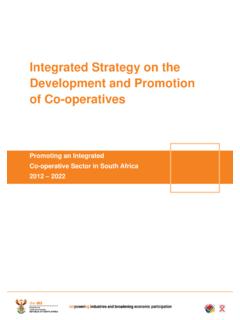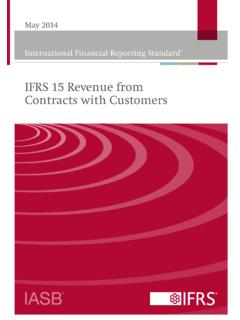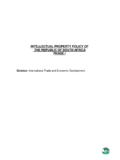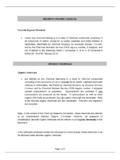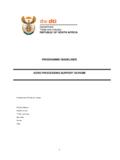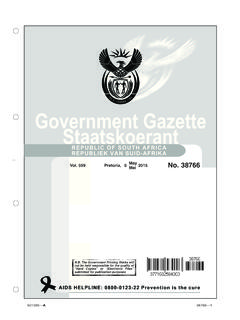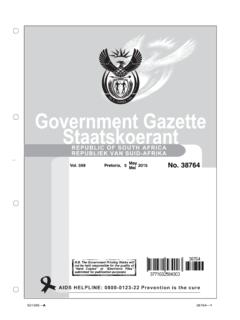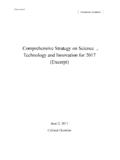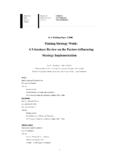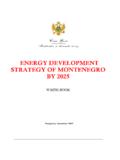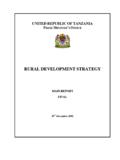Transcription of TABLE OF CONTENTS - Department of Trade and …
1 1 TABLE OF CONTENTSLIST OF - THE TRANSFORMATION THE ECONOMIC LEGACY OF legacy of Apartheid, stabilising the economy and extending basic the South African economy and laying the foundation for Broad-Based Black Economic support from government for and lessons strategy FOR BROAD-BASED BLACK ECONOMIC Broad-Based Black Economic objectives of instruments to achieve for IDC s role in financing Black Economic WAY A - A balanced scorecard for Broad-Based Black Economic B - Definitions of Black Empowerment C - Draft regulations governing the functioning and establishment of the Black Economic Empowerment Advisory D - Aligning the current support measures with the broad-based black economic empowerment of AcronymsANC African National CongressBBSDP Black Business Supplier Development ProgrammeBEE Black Economic Empowerment (BEE)BEECom Black Economic Empowerment CommissionBOSMEs Black-Owned Small and Medium EnterprisesCBO Community-Based OrganisationCBPWP Community-Based Public Works ProgrammeCosatu Congress of South African Trade UnionsCPPP Community Public Private Sector PartnershipCR Community ReinvestmentCRA Community Reinvestment ActCSIR Council for Scientific and Industrial ResearchDACST Department of Arts, Culture.
2 Science and TechnologyDBSA Development Bank of Southern AfricaDEAT Department of Environmental Affairs and TourismDFI Development Finance InstitutionsDLA Department of Land AffairsDME Department of Minerals and EnergyDoE Department of EducationDoH Department of HousingDoL Department of LabourDPLG Department of Provincial and Local GovernmentDPSA Department of Public Service and AdministrationDPW Department of Public WorksDWAF Department of Water Affairs and ForestryEAP Economically Active PopulationEDSA Entrepreneurial Development Southern AfricaEIG Empowerment Investment GrantEMIA Export Marketing and Investment AssistanceESC Entrepreneurial Support CentreESOP Employee Share Ownership ProgrammeFIG Foreign Investment GrantGDP Gross Domestic ProductGEAR Growth, Employment and RedistributionHBDC Highveld Business Development CentreHDIs Historically Disadvantaged IndividualsHDPs Historically Disadvantaged PersonsHDPs Historically Disadvantaged PersonsHEDC Highveld Entrepreneurial Development CentreHRD Human Resources DevelopmentICT Information and Communication TechnologyICTs Information and Communication TechnologiesIDC Industrial Development Corporation23 IDRC Independent Development Research CentreIDT Independent Development TrustIDU Investment Development UnitIDZ Industrial Development ZoneIMS Integrated Manufacturing StrategyISRDS Integrated Sustainable Rural Development StrategyLBSC Local Business Service CentreLED Local Economic DevelopmentMAC Manufacturing Advice CentreMAP Manufacturing Advice ProgrammeMFI Micro-Finance IndustryMFRC Micro-Finance Regulatory CouncilMTEF Medium-Term Expenditure FrameworkNAFCOC National African Federated Chamber of CommerceNEDLAC National Economic
3 Development and Labour CouncilNEF National Empowerment FundNGOs Non-governmental organisationsPII Partnership in Industrial InnovationPPFA Preferential Procurement Framework ActPPP Public Private PartnershipsR&D Research and DevelopmentRDP Reconstruction and Development ProgrammeRFI Retail Finance InstitutionsRIDP Regional Industrial Development ProgrammeSADC Southern African Development CommunitySARS South African Revenue ServiceSDIs Spatial Development InitiativesSICs Standard Identification CodesSME Small and Medium EnterpriseSMEDP Small and Medium Enterprise Development ProgrammeSMME Small, Micro and Medium EnterpriseSOE State-Owned EnterpriseSPF Sector Partnership FundSPII Support Programme for Industrial InnovationSPV Special Purpose VehicleSR Social ResponsibilityTDI Targeted Development InvestmentTEO The Enterprise Organisationthe dti The Department of Trade and IndustryTIDP Trade and Industrial Development ProgrammeURP Urban Renewal ProgrammeNotesSouth Africa s Economic Transformation: A strategy for Broad-Based Black Economic Empowerment4 Notes5 INTRODUCTION - THE TRANSFORMATION Our country requires an economy that can meet the needs of all our economic citizens our people and their enterprises in a sustainable manner.
4 This will only be possible if our economy builds on the full potential of all persons and communities across the length and breadth of this country. Government s objective is to achieve this vision of an adaptive economy characterised by growth, employment and equity by 2014. Apartheid systematically and purposefully restricted the majority of South Africans from meaningful participation in the economy. The assets of millions of people were directly and indirectly destroyed and access to skills and to self-employment was racially restricted. The accumulation process under Apartheid confined the creation of wealth to a racial minority and imposed underdevelopment on black communities. The result is an economic structure that today, in essence, still excludes the vast majority of South Africans. It is crucial to understand the magnitude of what took place in our past in order to understand why we need to act together as a nation to bring about an economic transformation in the interest of all.
5 The vision of an economy that meets the needs of the people in a more equitable manner goes back to the Freedom Charter of 1955. This was refined and developed in the contemporary context in the Reconstruction and Development Programme (1994). The need to effect redress in the interests of equity is also embodied in our Constitution. Subsequently, government has outlined broad economic strategies to transform the economy by 2014. These strategies include the Microeconomic Reform strategy and a range of specific strategies such as the Integrated Manufacturing strategy and the National Research and Development strategy . The period since 1994 has seen the South African economy undergo profound restructuring. Ten years of consistent economic growth has been recorded. Macroeconomic stabilisation has largely been achieved, providing a platform for accelerating the growth rate. The economy has become increasingly integrated into global markets and has become a successful exporter of manufactured goods and value-added services.
6 South Africa is now able to position itself as an advanced manufacturing economy. Despite the economic successes and a broad range of state policy, strategy and programme interventions aimed at overcoming economic disparities, entrenched inequalities continue to characterise the economy and act as a deterrent to growth, economic development, employment creation and poverty eradication. Vast racial and gender inequalities in the distribution of and access to wealth, income, skills and employment persist. As a consequence, our economy continues to perform below its full potential. Societies characterised by entrenched gender inequality or racially or ethnically defined wealth disparities are not likely to be socially and politically stable, particularly as economic growth can easily exacerbate these inequalities. Therefore the medium- to long-term sustainability of such unequal economies is vulnerable. Accordingly, in South Africa, the socio-political and moral imperative to redress racial discrimination is also an imperative dictated by the need for sustainable growth.
7 South Africa s integration into the global economy means that it is exposed to both the positive and negative forces that constitute the process of globalisation. Globalisation can further entrench existing inequalities and further marginalise those on the periphery. Increased inequality and uneven development poses a real danger for all economies, both developing and industrialised. In South Africa, however, inequality and uneven development have extremely strong racial characteristics, which represent a threat to our young democracy. Therefore, NotesSouth Africa s Economic Transformation: A strategy for Broad-Based Black Economic Empowerment4 Notes5an economic transformation strategy must form part of government s strategic approach to globalisation to ensure that we benefit from these processes and not suffer deleterious effects. More than just an economic imperative, the deracialisation and engendering of our economy is a moral requirement in keeping with the values and principles of equity enshrined in our Constitution.
8 Progress has been recorded in undoing the legacy of the past, however, the extent to which this economic success has been shared by all of our people is still inadequate for the requirements of a stable and prosperous society. The time is right for the introduction of a comprehensive and focused strategy for broad-based black economic empowerment. Black economic empowerment is already an unfolding process in our economy, however, this document outlines the more comprehensive and focused strategy that is now needed and adds impetus to the process by providing greater clarity and certainty. The document begins with an analysis of the legacy of dispossession and disempowerment that characterised our economic development until 1994. It is essential that we understand this in order to comprehend actions which are needed for success. The steps taken to overcome this legacy are examined and lessons from this experience are extracted. This strategy document is the outcome of an extensive consultation process within government and with the private sector.
9 It is informed by contributions of the Black Economic Empowerment Commission as well as the views of the President s Black Business and Big Business working groups. The Trade and Industry Chamber of the National Economic Development and Labour Council have also considered the matter and their inputs have been The strategy consists of a policy statement and a statement of the policy instruments that government will be using consistently and predictably. These include the formalisation of partnerships and charters with the private sector; the use of a balanced scorecard approach for gauging success; and, an Act that allows for the formalisation of guidelines and codes and the establishment of an Advisory Council. Several of these instruments are elaborated on in appendices to the strategy . In addition, new financial support measures are introduced and existing financial support is better aligned with the strategy . In general there is now considerable information available on the policy intention and approach of government.
10 Copies of the Broad-Based Black Economic Empowerment strategy can be obtained from the dti s website ( ) or from the dti s offices in Pretoria and Cape Town, as well as the provincial Departments of Economic Development, or call the dti s Customer Contact Centre on 0861 843 384. The dti encourages all interested parties to provide comments on this strategy , and to participate in any parliamentary hearings that will be convened on this important public policy matter. All contributions will receive serious consideration and the document will be refined accordingly so that it can be formally published when the enabling legislation is passed later this year. NotesSouth Africa s Economic Transformation: A strategy for Broad-Based Black Economic Empowerment6 Notes7 OVERCOMING THE ECONOMIC LEGACY OF The South African economy is performing well given its Apartheid and colonial legacy and the current global downturn. South Africa has enjoyed 10 years of consistent growth.
